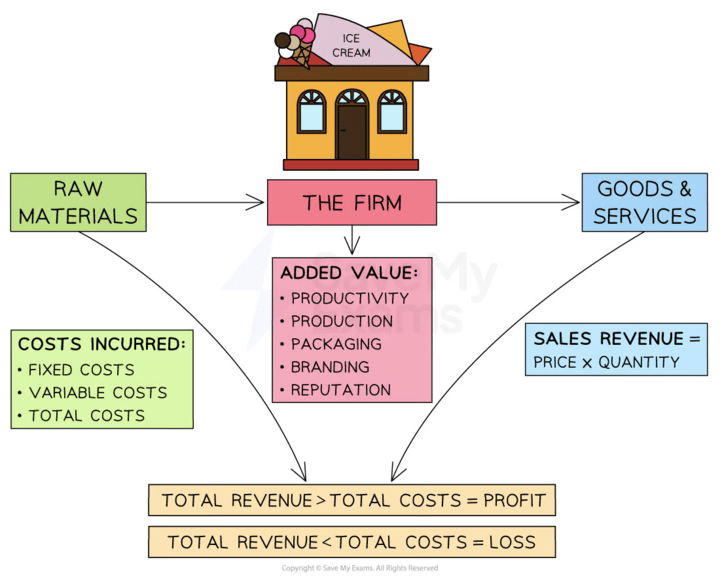Syllabus Edition
First teaching 2025
First exams 2027
The Importance of Profit (Cambridge (CIE) IGCSE Business): Revision Note
Exam code: 0450, 0986 & 0264, 0774
What is profit?
Profit is the difference between the total revenue and the total costs of a business
Most businesses have the main objective of making a profit
Profits help new businesses survive and break-even
It is a reward for risks taken by entrepreneurs and investors
For more established businesses, profits can enable long-term growth
The simplest formula for calculating profit is:
Profit can be categorised into net profit and gross profit
Gross profit is the difference between the money received from selling goods or services and the cost of making or providing them
It is calculated using the formula
Net profit is the difference between the gross profit and all of the other business expenses
It is calculated using the formula
Profit is the surplus that remains after business costs have been subtracted from the total sales revenue
If costs exceed revenue, the business makes a loss
The process of making a profit

Profit can be increased using the following strategies:
Increasing sales revenues
Reducing costs
A combination of increasing revenue and reducing costs
Examiner Tips and Tricks
Don’t just say profit is a “reward” – in exams, show its wider importance, such as providing finance for growth, measuring success, and attracting investors
Why is profit important?
Profit is the financial reward
That entrepreneurs receive in return for the risks they take
Business owners invest long hours, creativity, their own money and effort to make a successful business
Profit is a useful source of finance
For example, retained profit can be used to fund the purchase of assets, pay bills and invest in research and development
Profit is an indicator of success
Profit levels can be compared over time and with similar businesses to determine how well a business is performing
Profit attracts new investors
Increasing profits suggest that a business is being run effectively and could be an attractive investment
Profit in the public and charity sector
Some public sector organisations, such as public corporations, can have the objective of making a profit
Although social objectives may be more important, such as serving the local community, profits are reinvested back into services such as education and healthcare
These profits, known as surpluses, are also used to improve quality and service efficiency
Social enterprises also need to make a profit to survive, as they often have similar objectives to grow so that they can fund their social objectives

Unlock more, it's free!
Was this revision note helpful?
